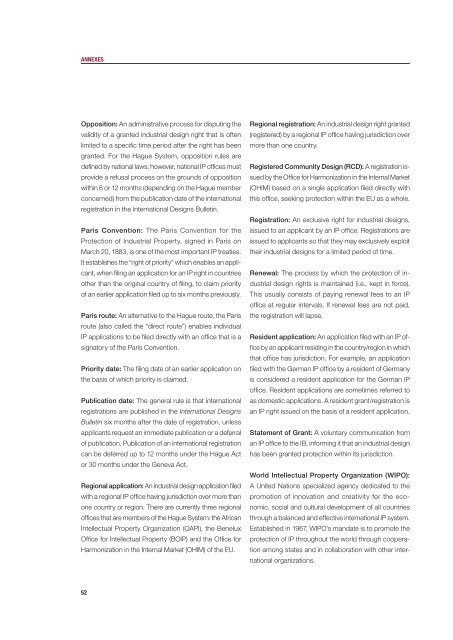wEyG1
wEyG1
wEyG1
You also want an ePaper? Increase the reach of your titles
YUMPU automatically turns print PDFs into web optimized ePapers that Google loves.
ANNEXES<br />
Opposition: An administrative process for disputing the<br />
validity of a granted industrial design right that is often<br />
limited to a specific time period after the right has been<br />
granted. For the Hague System, opposition rules are<br />
defined by national laws; however, national IP offices must<br />
provide a refusal process on the grounds of opposition<br />
within 6 or 12 months (depending on the Hague member<br />
concerned) from the publication date of the international<br />
registration in the International Designs Bulletin.<br />
Paris Convention: The Paris Convention for the<br />
Protection of Industrial Property, signed in Paris on<br />
March 20, 1883, is one of the most important IP treaties.<br />
It establishes the “right of priority” which enables an applicant,<br />
when filing an application for an IP right in countries<br />
other than the original country of filing, to claim priority<br />
of an earlier application filed up to six months previously.<br />
Paris route: An alternative to the Hague route, the Paris<br />
route (also called the “direct route”) enables individual<br />
IP applications to be filed directly with an office that is a<br />
signatory of the Paris Convention.<br />
Priority date: The filing date of an earlier application on<br />
the basis of which priority is claimed.<br />
Publication date: The general rule is that international<br />
registrations are published in the International Designs<br />
Bulletin six months after the date of registration, unless<br />
applicants request an immediate publication or a deferral<br />
of publication. Publication of an international registration<br />
can be deferred up to 12 months under the Hague Act<br />
or 30 months under the Geneva Act.<br />
Regional application: An industrial design application filed<br />
with a regional IP office having jurisdiction over more than<br />
one country or region. There are currently three regional<br />
offices that are members of the Hague System: the African<br />
Intellectual Property Organization (OAPI), the Benelux<br />
Office for Intellectual Property (BOIP) and the Office for<br />
Harmonization in the Internal Market (OHIM) of the EU.<br />
Regional registration: An industrial design right granted<br />
(registered) by a regional IP office having jurisdiction over<br />
more than one country.<br />
Registered Community Design (RCD): A registration issued<br />
by the Office for Harmonization in the Internal Market<br />
(OHIM) based on a single application filed directly with<br />
this office, seeking protection within the EU as a whole.<br />
Registration: An exclusive right for industrial designs,<br />
issued to an applicant by an IP office. Registrations are<br />
issued to applicants so that they may exclusively exploit<br />
their industrial designs for a limited period of time.<br />
Renewal: The process by which the protection of industrial<br />
design rights is maintained (i.e., kept in force).<br />
This usually consists of paying renewal fees to an IP<br />
office at regular intervals. If renewal fees are not paid,<br />
the registration will lapse.<br />
Resident application: An application filed with an IP office<br />
by an applicant residing in the country/region in which<br />
that office has jurisdiction. For example, an application<br />
filed with the German IP office by a resident of Germany<br />
is considered a resident application for the German IP<br />
office. Resident applications are sometimes referred to<br />
as domestic applications. A resident grant/registration is<br />
an IP right issued on the basis of a resident application.<br />
Statement of Grant: A voluntary communication from<br />
an IP office to the IB, informing it that an industrial design<br />
has been granted protection within its jurisdiction.<br />
World Intellectual Property Organization (WIPO):<br />
A United Nations specialized agency dedicated to the<br />
promotion of innovation and creativity for the economic,<br />
social and cultural development of all countries<br />
through a balanced and effective international IP system.<br />
Established in 1967, WIPO’s mandate is to promote the<br />
protection of IP throughout the world through cooperation<br />
among states and in collaboration with other international<br />
organizations.<br />
52


